Ten years ago, the Indigenous and Women of Color Feminist Delegation issued its historic statement, Justice for Palestine: A Call to Action from Indigenous & Women of Color Feminists. First published in Electronic Intifada and Jadaliyya and shared by the BDS movement and multiple other sites, the statement was translated to Spanish by delegation member Melissa Garcia, to French by our colleague Dr. Paola Bacchetta who also connected with other colleagues in the decolonizing-queer network with Doris Pumphrey and Dr. Jin Haritaworn for a German translation, and Tiz for the Italian translation. As an urgent call for action in solidarity with the struggle of the Palestinian people, the statement followed a 10-day visit to occupied Palestine by the first delegation of feminists from Indigenous, Black, Latinx, and Asian communities, made up of 11 scholars, activists, and artists, including two male relatives of delegation members.
Today we also publish the long overdue delegation’s statement in Arabic thanks to AMED intern, Hedaia, and her father Imad Ayani who did such a great job of providing a contextualized and content-conscious translation. The Arabic translation is part of the debt the delegation owes to Palestine, individuals, groups and institutions alike. It is but a small token of completing promises we made 10 years ago.
The delay in translating the statement to Arabic as well as publishing the translation in other languages, which we do here for the first time is not random nor accidental; it’s rather symptomatic of the lack of resources for both grassroots organizing, in general and and for Teaching Palestine: Pedagogical Praxis and the Indivisibility of Justice and AMED Studies in particular that has been subjected to unstoppable attacks by the Israel Lobby Industry and its right-wing, white supremacist, and neoliberal allies whether they are represented by the Biden Administration, Facebook feigning to be neutral or SFSU Administration that is run as a corporation where the President is the actual CEO. In short, constructing advocacy for justice in/for Palestine as a “neutral” or an “uninterested” project doesn’t wash in an Israeli-centric context of the neoliberal university that demands the dismantling of in-your-face programs such as AMED Studies that is unapologetic about decolonizing the curriculum and commitments to open classrooms and research that is accountable to the community as the Spirit of ‘68 demands. This is true of California Ethnic Studies Curriculum, the attacks on Critical Race Theory, and the shutting down of programs in women and gender studies, sexuality studies, Xicao/a/x studies and any pedagogical project that challenges the status quo. This similarly applies to the most recent letter of resignation of Professor Cornel West from Harvard University, the attacks against AMED Studies, and to the decision to rescind the Fred Shuttleworth Human Rights Award to Angela Davis because of her support for Palestine. The push back against Israel lobby silencing and bullying is also there for all to see. The Union Theological Seminary offered Dr. West a position fitting with his stature and contributions and the Shuttleworth award had to be reinstated to Davis, a member of our delegation, upon the exposure of behind-the-scenes-dealing-and-wheeling by the Israel lobby and its right wing supporters.
We report here on the June 23rd virtual reunion of the delegation we convened under the title A Report Card to “reaffirm the relevance and urgency of the re-telling of stories of Palestinian steadfastness, resistance, and resilience to Apartheid, ethnic cleansing, and settler colonialism,” that left a huge impact on the delegation. Throughout this year we plan to hold more international/transnational conversations between members of the delegation and the Palestinian activists, leaders, scholars and public intellectuals who have generously contributed their time, energies, and intellectual labor of love to host us, embrace the delegation and facilitate our ability to advocate for justice in/for Palestine. These spaces will center Palestinian voices and experiences here and within the struggle for a better world for all of us.
The June 23rd virtual reunion was co-organized by the Arab and Muslim Ethnicities and Diasporas (AMED) Studies and the People’s Forum, and co-sponsored by several US- and Palestine-based institution including American Muslims for Palestine, Center for Development Studies at Birzeit University, Eyewitness Palestine, Mutawin Institute for democracy and Human Rights at Birzeit University, International Campaign to Defend Dr. Abdulhadi, Jewish Voice for Peace-Boston, National Black Education Agenda, National Students for Justice in Palestine, Palestinian Youth Movement, Northern California Friends of Sabeel, Palestinian Feminist Collective, US campaign for Academic and Cultural Boycott of Israel and Women in Black Union Square.
Though facilitated by Rabab Abdulhadi, founding director and senior scholar of the AMED program, the virtual reunion was a collective effort by delegation members and coalition partners. While it might have appeared as a rehearsed event to the viewers on the eight live-streamed platforms, it was anything but scripted. Instead it was a dynamic, organic and spontaneous gathering with all the trappings, excitement and messiness of a family reunion. This group of leading feminist public intellectuals were deciding collectively and on the spot who would go next so we could keep the flow going. All the while, we were consciously aware that we were not performing for personal aggrandizement but rather in the interests of advancing justice in/for Palestine within a conceptual and pedagogical framework of the indivisibility of justice for all. Would it have been better for Angela Davis to go before Chandra Talpade Mohanty? Should Beverly Guy-Sheftall go after or before Barbara Ransby? Is it preferable for Gina Dent to follow Premilla Nadasen and Anna Guevarra or step in ahead? What were we trying to accomplish? What were our goals and how were we doing it were constantly on our minds. No egos, no divas, no prima donnas! It was all about being true to the objectives for which we came together in the first place ten years ago! There was absolutely no debate whether Waziyatawin should give the full land acknowledgement or that anyone in the delegation was not utterly grateful and appreciative of Melissa Garcia’s tireless efforts to put together a slideshow at the last minute from shared photos and images by delegation members and make that make sense.
It was in the same spirit that the volunteers offered their labor of love and their time and devotion to make this reunion a success: graphic artist Daisy Diamond created the flyer; Layan Fuleihan and David Chung of the People’s Forum were true collaborators; Harry Soloway and Dr. Rosalind Petchesky facilitated the offer of a People’s Forum temporary refuge for AMED Studies; Saliem Shehadeh not only helped with the technical issues and worked behind the scenes with David Chung to troubleshoot technical problems and make our lack of a platform sound seamless but Saliem’s imprints were all over the conceptualization and the framing of the event; the support by AMED grad and undergraduate students Leith Ghuloum and Asma Khouja took a load off while we were organizing the event; and those who not only sponsored but generously supported the program made it possible. We want to especially give a shout out to Omar Zahzah from Eyewitness Palestine and the Palestinian Youth Movement and to AMED interns Asma Barakat, Jade Musa and Hedaia for their research support and social media work.
All members of the delegation, including Ayoka Chenzira who could not make it on June 23rd due to a prior scheduling conflict, agreed that the virtual reunion had to reflect both the pain of witnessing Palestinian experiences under Israeli colonial rule as well as the resilience and revolutionary optimism that stubbornly came through loud and clear from Palestinian hosts. Members of the delegation had met with academics, students, youth leaders of civic organizations, trade unions, as well as residents of refugee camps that had been systematically attacked by Israeli soldiers and colonial settlers. It was truly a tall order to attempt to recapture these rich experiences in two hours with ten feminist scholar-activists who are used to lecturing inside and outside the classroom for hours. But we made it happen.
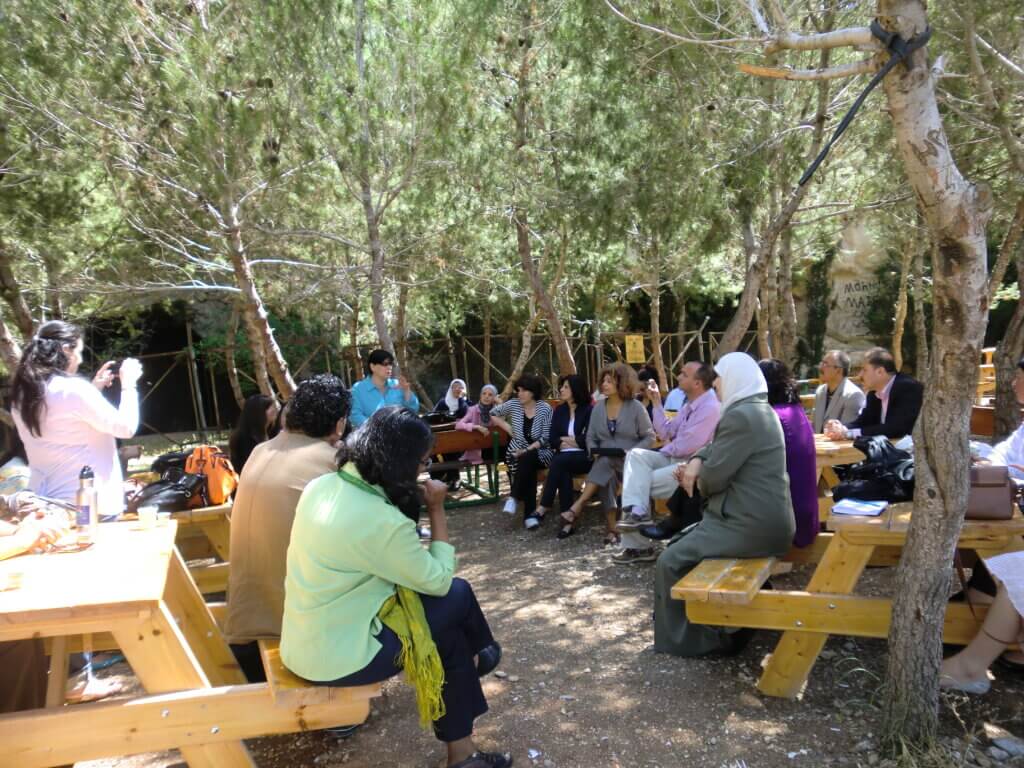
At the outset and as has been the practice at AMED Studies even before it became trendy to do so, Dr. Abdulhadi opened up by acknowledging that her campus, San Francisco State University, sits on stolen indigenous land of the Ahlone and the Coastal Miwok people. And she immediately passed it on to Dr. Waziyatawin, from the Dakota homelands of Minnesota, who framed her land acknowledgement as an invitation to panelists and participants to celebrate the determination and courage of all people living under settler colonialism. Dr. Waziyatawin spoke of the resilience of the “Indigenous struggles here in the US, and through our Palestinian relatives despite the violent and life destroying process” of settler-colonialism. She also spoke of the resolve of Indigenous people to reclaim their homeland ending her land acknowledgement with a reminder that “we belong to the land and the land belongs to us.”
As part of her contribution, Melissa Garcia then introduced a slideshow of photos she and other delegation members took while visiting Palestine, noting the significance of documenting the trip which was the first for every delegation member other than Dr. Abdulhadi, a native of Palestine, and stressing why it was so crucial to approach this trip as committed, rather than “neutral” observers. Noting the importance of this communal bearing witness to the immediate and concrete experiences Palestinians suffered at the hands of Israeli settler-colonialism, Gracia described village doors that had been damaged from repeated settler and soldier attacks, infrastructure such as water tanks that had been tampered with by settlers in the village of Awarta, outside Nablus. Garcia spoke of the Palestinian woman who described her everyday terror caused by settlers and state violence while highlighting how the latter’s resilience to such terror left her, Garcia, with purpose and intention, and made her to reevaluate the ways in which she approaches her analysis’ of activism and feminism.
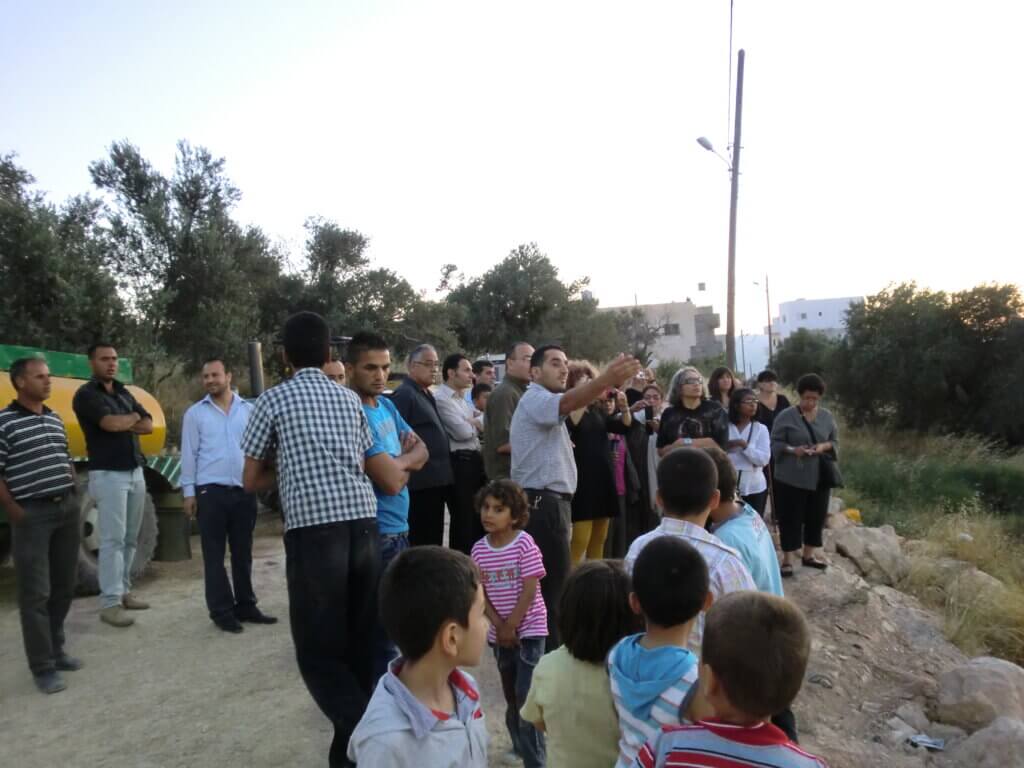
Dr. Barbara Ransby, who co-organized the delegation with Dr. Abdulhadi, spoke next, referring to the very concrete materiality of Israeli occupation the delegation witnessed, specifically the ominous Apartheid wall. Dr. Ransby noted that even within the space of literal concrete violence, evidence of creative and insurmountable Palestinian resistance came through in graffiti work and messages of solidarity. She invoked the delegation’s visit with El-Kurd family home in Sheikh Jarrah, where they were welcomed by the late Rifqa (Um-Nabil) El-Kurd (RIP), an 88-year-old Palestinian refugee who detailed how she and her family were forcibly expelled overnight from half of their house. Ransby drew parallels between the violent intimacy of chattel slavery and the violent physical (and intimate) dispossesison of Rifqa El-Kurd.
Concurring with the impact of the visit to El-Kurd family home and the impressive resilience of the Sheikh Jarrah community in the face of ethnic cleansing, Dr. Beverly Guy-Sheftall highlighted a number of connections with the Black Struggle in the US that participating in this delegation brought up in her mind. Dr. Guy-Sheftall shared a powerful moment of solidarity the delegation experienced, when freed Palestinian political prisoners linked armed with, and led the delegation members in singing, “We Shall Overcome.” Dr. Guy-Sheftall also recalled the delegation’s experience of having their bus searched at the Jalame checkpoint by Israeli security German Shepherds, hearkening back to experiences of sit-inners and Freedom Riders with police dogs in the Jim Crow South.
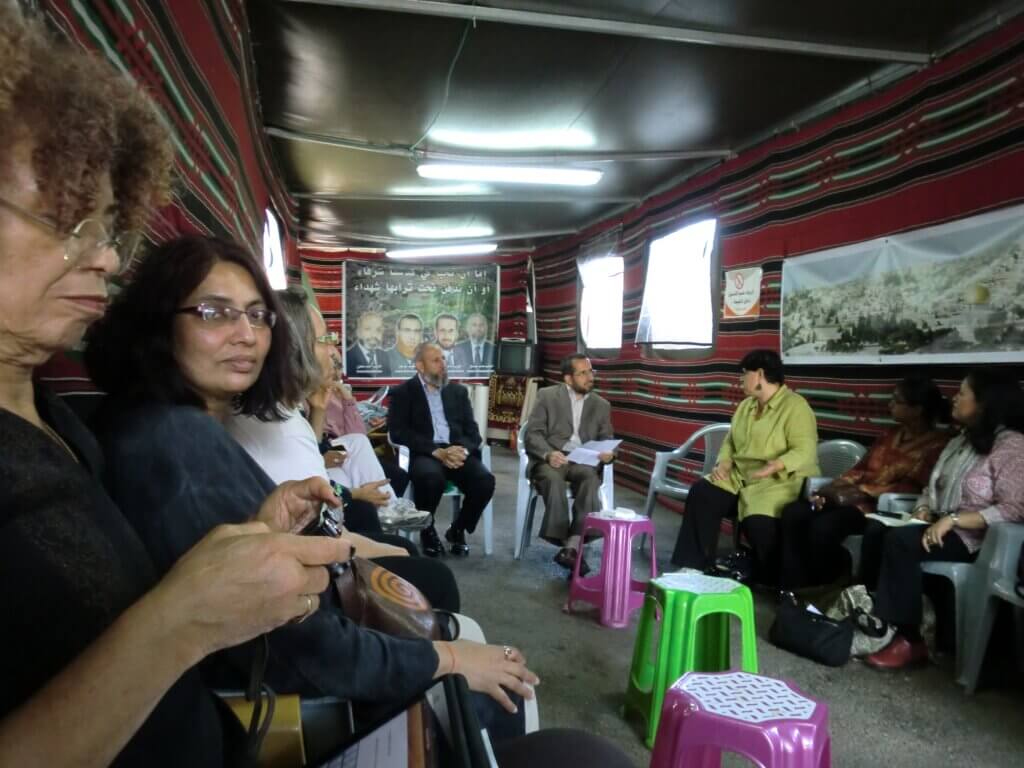
Dr. Chandra Talpade Mohanty affirmed the very real material consequences of Israeli settler colonialism that were manifest throughout the delegation, including her own experiences at checkpoints, segregated roads and the visible immobility imposed on Palestinians by the Israeli State. Her belongings, which contained a booklet from Addameer that displayed images of mothers of prisoners at a protest sit-in, were subjected to invasive search by the Jalame Israel security. As a South Asian feminist, Talpade Mohanty invoked the varying lenses of consciousness with which the delegation was able to engage which led her to a deeper analysis of settler colonialism and apartheid and their connections to racism, sexism and misogyny.
Dr. Premilla Nadasen recalled the urgency of the moment shared by delegation members that prompted them to travel to Palestine in 2011 and noted how such urgency was more true today. Describing how her experiences growing up under Apartheid in South Africa were viscerally brought to mind by the Apartheid wall, Dr. Nadasen made connections to the pass book and homeland systems of Apartheid South Africa that were designed in a similar vein, ending by commemorating the recent 45th anniversary of the Soweto uprising as an activist in the anti-Apartheid movement.
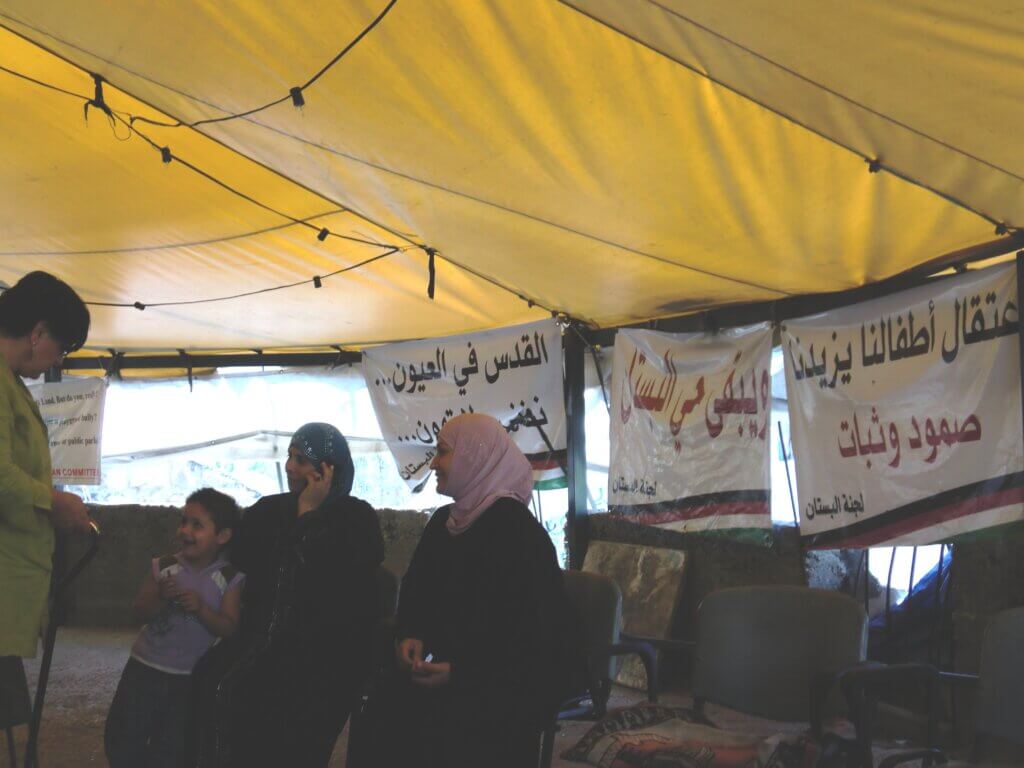
Dr. Anna Guevarra also made connections to her own experiences growing up and being active in the movement against the authoritarian regime in the Philippines. Dr. Gueverra read out the text of a sign she remembered at the Jalame Checkpoint, at which Talpade Mohanty’s belongings were invasively searched and where Guy-Sheftall witnessed the use of German Shepherds in Israeli policing. Dr. Guevarra saw US culpability through its USAID program, saying that the sign, “funded by the American people through the US Agency for International Development, to foster greater trade and development of the area,” could have been easily found in the Philippines, linking experiences of state violence that are endorsed and paid for by the U.S. empire.
Through her own work on prison abolition, Dr. Gina Dent saw her visit as a reminder of the damage prisons do. Every Palestinian the delegation met seemed in one way or another to be connected to the Israeli State “criminal legal system,” Dr. Dent said, noting a 10-year-old boy the delegation met in Hebron who had been incarcerated numerous times. She remembered the discussion Dr. Abdulhadi had with Israeli youth who were activists against the Israeli occupation. As delegation members met with Sahar Francis, Dr. Dent recalled learning about Israeli prison conditions and how the layered system of occupation law created major impediments to prisoners attaining freedom, including prisoners being forced to pay for their own detention.
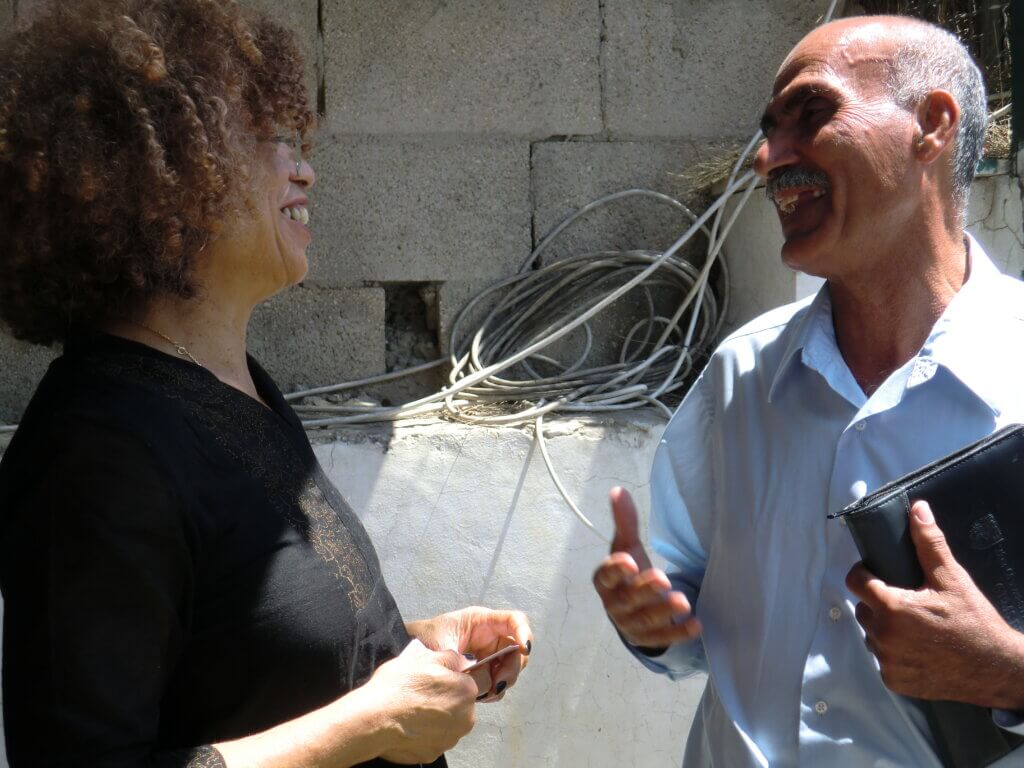
Jerusalem, June 18, 2011. (Credit: Indigenous and Women of Color Feminist Delegation to Palestine.)
Dr. Angela Davis who has been targeted by Israel lobby groups for her advocacy for Palestinian freedom, reiterated the value of the trip, emphasizing internationalist solidarity. Dr. Davis recalled how uplifting it was for her to thank in-person one of the co-authors of the letter of support she received from Palestinian prisoners while she was incarcerated. Smuggled out of an Israeli prison, the letter made its way across borders, land and sea, to her US prison cell, symbolizing the “unbreakable ties of solidarity” between the Palestinian and Black liberation movements. Dr. Davis remarked on a concrete example of “Palestinian freedom rides” that protested the Israeli segregation of highways, noting how historic Black leaders recognized the similarities with the Freedom Riders in North America.
Closing the first round, Dr. Waziyatawin described the surreal experiences of pain to which her family and ancestors must have felt during invasion and occupation that were invoked by listening to Palestinian stories, noting the high tech colonial Zionist project that is “entirely modern.” Dr. Waziyatawin commented on how it has been used to promote a “civilized/savage imagery” in Palestine and Turtle Island, comparing the tactics and technology used to oppress Palestinians to those applied to suppress water protectors at Standing Rock, where protestors were faced with dogs, barbed wire, surveillance, arrest, and searches by the US state.
In the second part of the virtual reunion, Dr. Abdulhadi raised conceptual questions of the impact of this particular delegation with its focus on feminist and queer liberation and its make up of Indigenous and women and color, as well as the significance of delegations in general. Starting off the conversation, Dr. Chandra Talpade Mohanty stressed how critical it was to have a community of women, each coming with her/their own experiences to create a space where they could together push beyond individual experiences on Palestine, and dialogue and pay attention to patriarchal and heterosexual roots of settler colonialism and Apartheid. In an Indigenous and Third World praxis of call and response that was to be repeated throughout the June 23rd reunion, Melissa Garcia communicated the effect of the trip on her own scholarship and pedagogy, emphasizing how visiting Palestine allowed her to incorporate her experiences and knowledge into her teaching. Dr. Premilla Nadasen reflected on how the delegation strengthened her analysis, perspectives and discussions of feminism in the U.S. and the phenomenon of the Palestinian issue being excised from those discussion, stressing that without a feminist delegation, the visibility of the gendered aspect of occupation might not have been recognized or interrogated. Agreeing with the difficulties of speaking up on Palestine in the academy Dr. Gina Dent argued for the need to combat the false narrative of “unresolvable complexity,” that is used to suppress the Palestinian struggle. Though being familiar with Palestine as a student of the late Palestinian professor Edward Said, Dr. Dent found that being part of a feminist delegation allowed her to deepen her own knowledge and how that was reflective of a critical facet of feminism, namely the need to continuously adjust our analysis in the face of “complexity,” rather than regulate it outside of analysis.
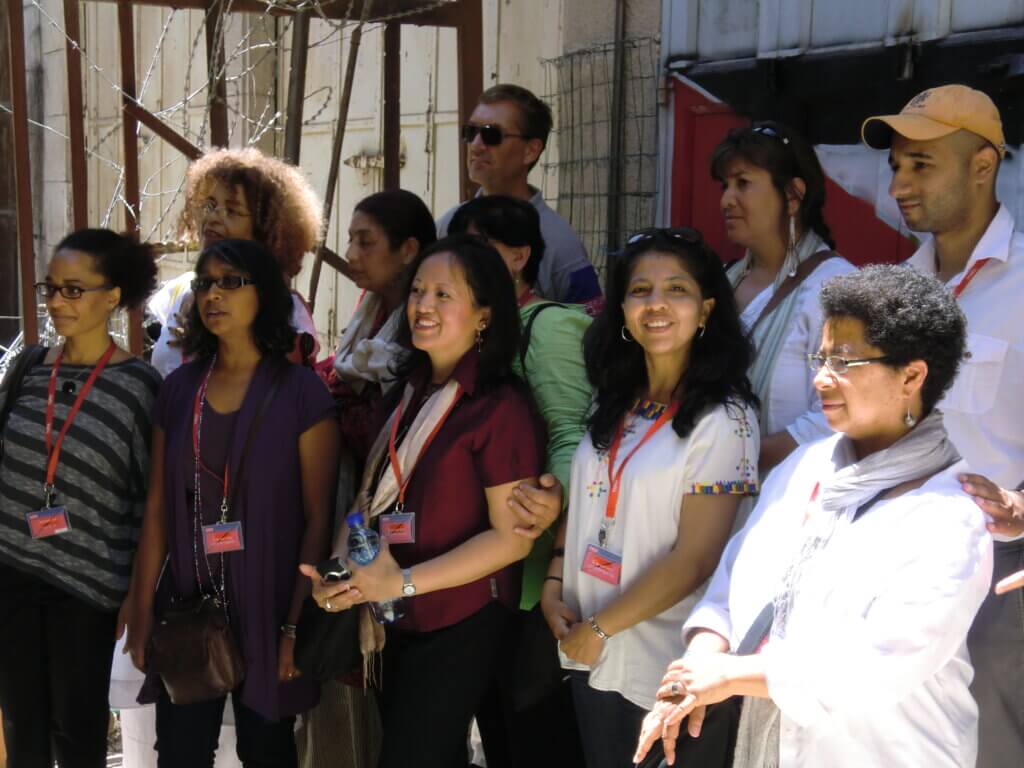
Dr. Barbara Ransby saw the impact of a specific important impact of a feminist, queer, indigenous and women of color specific delegation on the support given to Palestinian political prisoner Rasmea Odeh, who was deported by the US in 2016. Dr. Ransby also made note of the increasing number of people who had specifically cited this delegation as the reason why “they saw a connection between defending Rasmea and their feminist praxis.” Dr. Abdulhadi remarked that in addition to Rasmea Odeh, other freed Palestinian prisoners, leaders and activists the delegation met, along with the delegation members were themselves “living archives,” who interactively worked together to produce new and communal anti-colonial, anti-racist critical justice-centered knowledge. She expressed how proud she was of the organic engagement between her two communities, members of the delegation here “at home” and Palestinian hosts “back home” that produced reciprocal and critical solidarities. Ultimately, she said, this delegation showed that justice is indivisible and that it cannot but include Palestine. Dr. Angela Davis responded that a major impact of this delegation in her view were the many other delegations of Indigenous people and people of color that followed. She also thought that the delegation led to a major transformation in the ways in which Palestinian solidarity has been viewed, specifically in the Black liberation movement in the United States. Dr. Gueverra concurred, adding that the power of the delegation lay in the solidifying commitment to linking different struggles and developing critical ways of intervening. Agreeing as well, Dr. Beverly Guy-Sheftall further highlighted the salient connections between Palestine and global liberation especially in Black spaces. She cited the founding of the first chapter of Students for Justice in Palestine (SJP) at Spelman College, one of the main historically Black Colleges for women. Dr. Waziyatawin concluded the second part of the discussion by affirming the unsustainability of industrialized civilization and occupation, finding hope in the opportunities for change in imperialism’s inevitable end.
Dr. Abdulhadi wrapped up the delegation’s tenth anniversary virtual reunion by acknowledging Dr. Ayoka Chinzera, a member of the delegation who was unable to attend. As an artist, Dr. Abdulhadi said that Dr. Chinzera would have wanted to speak about Handala, a cartoon figure created by the late Naji Al-Ali, a Palestinian cartoonist who was assassinated by Israeli intelligence. In all Al-Ali’s cartoons, Handala stands before the world as a Palestinian refugee child in torn clothing, and not unlike the Black Olymics athletes in 1968, barefoot, bearing witness to injustice. Dr. Barbara Ransby reiterated the need to continue to talk about Palestine against and despite censorship. And along with Handala, delegation members, present in spirit if not in person, concluded their historical anniversary with a renewed call to action, to be in these streets, to organize for freedom, dignity and freedom for all.
Dr. Rabab Abdulhadi
Dr. Rabab Abdulhadi is the founding director and senior scholar of the Arab and Muslim Ethnicities and Diasporas (AMED) Studies, Associate Professor of Ethnic Studies and affiliated faculty in Sexualities Studies.
Jade Musa
Jade Musa is intern with the Arab and Muslim Ethnicities and Diasporas (AMED) Studies department at San Francisco State University. She received her BA in Political Science with a Research Distinction from the Ohio State University where she was awarded the Henry R. Spencer Award for most outstanding senior honors thesis, titled “Dependency or Domination: An application of state theory to Palestine and Israel”. She served as President for Students for Justice in Palestine at OSU from 2020-2021
So where are the Palestinian voices in mainstream media?
Mondoweiss covers the full picture of the struggle for justice in Palestine. Read by tens of thousands of people each month, our truth-telling journalism is an essential counterweight to the propaganda that passes for news in mainstream and legacy media.
Our news and analysis is available to everyone – which is why we need your support. Please contribute so that we can continue to raise the voices of those who advocate for the rights of Palestinians to live in dignity and peace.
Palestinians today are struggling for their lives as mainstream media turns away. Please support journalism that amplifies the urgent voices calling for freedom and justice in Palestine.
 RSS Feed
RSS Feed















 July 16th, 2021
July 16th, 2021  Awake Goy
Awake Goy  Posted in
Posted in  Tags:
Tags: 













